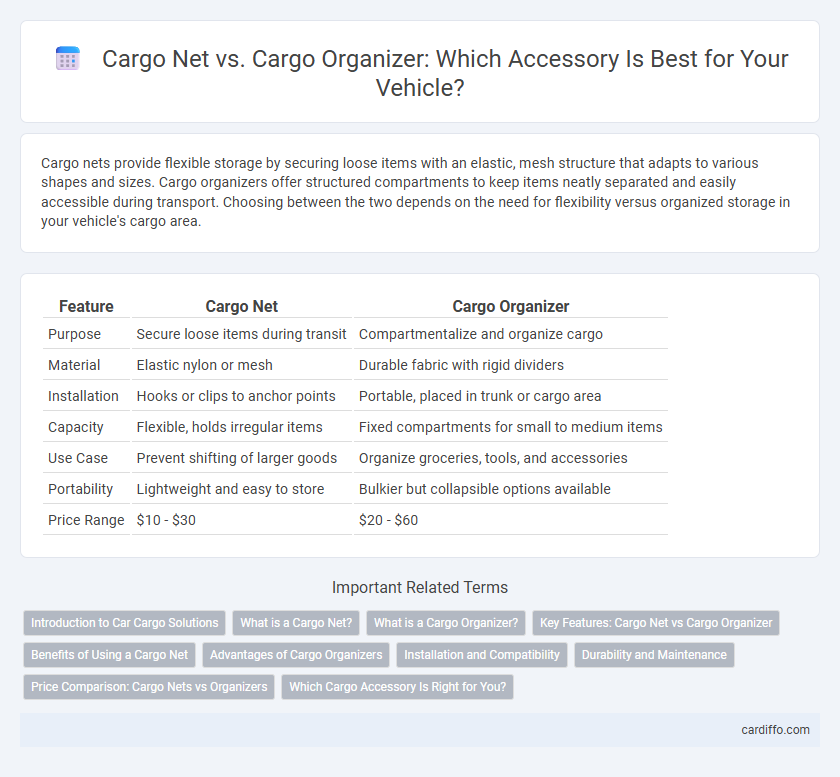Cargo nets provide flexible storage by securing loose items with an elastic, mesh structure that adapts to various shapes and sizes. Cargo organizers offer structured compartments to keep items neatly separated and easily accessible during transport. Choosing between the two depends on the need for flexibility versus organized storage in your vehicle's cargo area.
Table of Comparison
| Feature | Cargo Net | Cargo Organizer |
|---|---|---|
| Purpose | Secure loose items during transit | Compartmentalize and organize cargo |
| Material | Elastic nylon or mesh | Durable fabric with rigid dividers |
| Installation | Hooks or clips to anchor points | Portable, placed in trunk or cargo area |
| Capacity | Flexible, holds irregular items | Fixed compartments for small to medium items |
| Use Case | Prevent shifting of larger goods | Organize groceries, tools, and accessories |
| Portability | Lightweight and easy to store | Bulkier but collapsible options available |
| Price Range | $10 - $30 | $20 - $60 |
Introduction to Car Cargo Solutions
Cargo nets offer flexible containment for irregularly shaped items, preventing them from shifting during transit, while cargo organizers provide structured compartments for neatly arranging tools, groceries, or gear. Both solutions enhance vehicle cargo management by maximizing storage efficiency and maintaining order in the trunk or cargo area. Choosing between a cargo net and a cargo organizer depends on the specific need for containment versus compartmentalization in car storage.
What is a Cargo Net?
A cargo net is a flexible, mesh accessory designed to secure loose items in vehicle trunks or truck beds, preventing them from shifting during transit. It attaches to anchor points using hooks or straps, providing a customizable and lightweight storage solution. Cargo nets are especially useful for containing irregularly shaped goods while maximizing cargo space efficiency.
What is a Cargo Organizer?
A cargo organizer is a versatile accessory designed to keep vehicle or storage areas tidy by compartmentalizing items with multiple pockets and adjustable dividers. Unlike a cargo net that primarily secures loose objects by stretching over them, a cargo organizer provides structured storage, preventing items from shifting during transit. This accessory enhances accessibility and maximizes space efficiency in cars, trucks, or SUVs.
Key Features: Cargo Net vs Cargo Organizer
Cargo nets offer flexible, stretchable mesh that secures loose items and prevents shifting during transit, ideal for irregularly shaped cargo. Cargo organizers provide structured compartments, often with multiple pockets and dividers, designed to neatly store and categorize smaller items for easy access. While cargo nets maximize space by conforming to the load, cargo organizers enhance organization and protect delicate items from damage.
Benefits of Using a Cargo Net
Cargo nets provide flexible and secure storage by preventing items from shifting during transit, enhancing vehicle safety and organization. Their elastic design accommodates various cargo sizes and shapes, maximizing space efficiency compared to rigid cargo organizers. Installing a cargo net also allows quick access to items without the need for compartmentalization, making it ideal for dynamic storage needs.
Advantages of Cargo Organizers
Cargo organizers offer enhanced compartmentalization, allowing for systematic storage and easy access to various items, which prevents clutter and maximizes trunk space efficiency. Unlike cargo nets, organizers provide rigid, multi-pocket structures that secure fragile or small belongings from shifting during transit. Their versatility includes adjustable sections and durable materials, making them suitable for different vehicle sizes and heavy-duty use, thereby improving overall cargo management.
Installation and Compatibility
Cargo nets typically offer universal compatibility with various vehicles due to their adjustable straps and flexible design, ensuring quick installation without the need for tools. Cargo organizers, on the other hand, may require specific fittings or anchor points that vary by vehicle make and model, making compatibility a critical factor before purchase. Installation of organizers often involves securing compartments or panels, which can be more time-consuming compared to the straightforward hook-and-loop or clasp systems used by cargo nets.
Durability and Maintenance
Cargo nets offer high durability due to their strong, stretchable nylon or polyester construction that resists tearing and weather damage, requiring minimal maintenance such as occasional cleaning with soap and water. Cargo organizers, often made from fabric or canvas materials with reinforced stitching, provide moderate durability but may wear faster under heavy use and require regular maintenance like spot cleaning and fabric treatment to maintain appearance. Both accessories enhance cargo management, but cargo nets typically outperform organizers in long-term durability and low-maintenance care.
Price Comparison: Cargo Nets vs Organizers
Cargo nets typically cost between $15 and $40, making them a budget-friendly option for securing items in vehicles. Cargo organizers are generally priced higher, ranging from $30 to over $100, depending on the material quality and compartment features. For those seeking affordability, cargo nets offer essential utility at a lower cost, while cargo organizers provide enhanced storage solutions with a higher investment.
Which Cargo Accessory Is Right for You?
Cargo nets provide flexible containment for irregularly shaped items, preventing them from shifting during transit while maximizing trunk space. Cargo organizers feature multiple compartments designed to keep smaller items neatly separated and easily accessible, ideal for daily commuters and parents. Choosing between a cargo net and a cargo organizer depends on your typical load size, item type, and convenience needs, ensuring optimal vehicle storage efficiency.
Cargo Net vs Cargo Organizer Infographic

 cardiffo.com
cardiffo.com